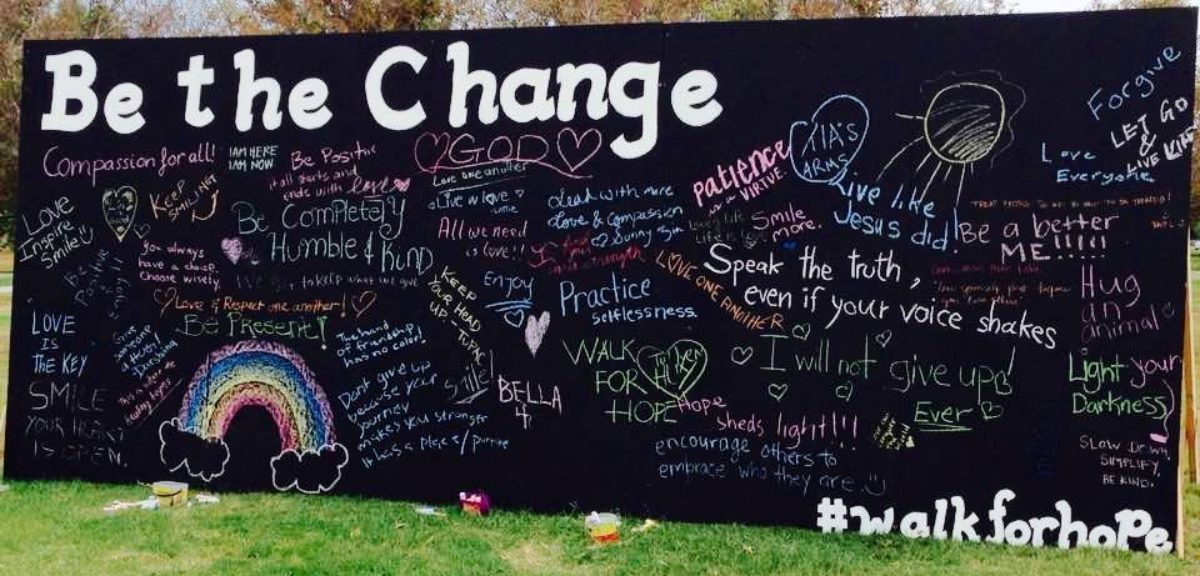About 20 Be the Cause volunteers, both new and familiar, made their way to the Los Angeles Mission to feed and wash the feet of over 3,000 homeless guests in celebration of Good Friday. It was a memorable day on Skid Row that also marked the first ever Compassion Cell in Los Angeles.
Of course it all began with a healthy dose of confusion. So I’m on my way to the mission when I get a phone call from Stacey: Matt, one of our new volunteers had already arrived but said that the police were out in the parking lot (our meeting point), with their shotguns drawn. I called Mahsa, who had also already arrived, but said the parking lot she was in was empty so she was just there: chilling. “Oh my God,” I’m thinking, “they’ve blocked off the area, someone’s going to get shot, someone’s going to get caught in the altercation or hauled down to the police station!!!” Either volunteer has to be in the wrong place and at the wrong time!! Meanwhile, Stacey and Sukh are lost. I’m lost. People are calling us because they’re lost. We’re searching for Mahsa and Matt. I drive deeper into the city, past the fancy hotels and into the squalor. There’s a guy wandering around on the street and he’s trying to tell me something. I roll my windows up and circle the area some more.
Finally, the universe leads us all safely to the same place, and a shuttle driven by an L.A. Mission resident/employee takes us to the main entrance where a throng of people are waiting. Someone announces over his radio that a fight is breaking out. I breathe and think that it’s just another day in L.A., another fact of life in this part of town.
The L.A. Mission is a Catholic organization run by clergy, volunteers and those homeless people who benefit most from its services — recovering junkies, gang members, the disabled, working people, young and old. They provide food and shelter Monday through Saturday, and are supported by donations. Twice a year they hold massive events such as this one, where they open their doors to feed thousands and offer free healthcare through their clinic.
We register in the Mission’s chapel, and talk as a group about why we had come, some from so far, to wash feet. Aside from the religious connotation (Jesus washed the feet of his disciples), it’s one of the most profound gestures of service and love. For many of us it’s the first time doing this; we have no medical training, so we move out into the street where we’re given a quick orientation on what to do. Some of us get squeamish at the mention of “open sores,” “bleeding ulcers,” and “fungus.” We each grab a basin, some soap, rubber gloves, anti-fungal cream and footpowder, set up our stations and wait.
Stacey, Aarti, Lili and Claudia (two newcomers) and myself are among the first to wash feet. Tyrone and Raymond come along. I’m a bit nervous so I don’t talk to Tyrone as much. But I learn that he’s disabled and lives nearby. To my pleasant surprise, when Raymond removes his socks (he put on clean ones, special for today), his feet weren’t that bad. Although we’re directed to check for any abnormalities and call them to the attention of the volunteer doctors present, I don’t see any problems. In fact, there’s no describing that sense of joy and appreciation, that look of relaxation. Raymond is giggling and his wife wants him to get the fungus on this pinky toe checked out. It’s all good. Each of us pamper our “client.” As we are on the edge of the footwashing tent, the media descends upon us, some even imploring, “Hold the foot up!” At that point I become self-conscious and realize that something very real and personal is happening here — something incredibly humbling and nurturing.
Having a healthy pair of feet means being able to get to somewhere safe and dry to sleep. It means making it on time to the Mission to get a meal and some help. Use of those feet means survival — be it from other people, the cops, the elements, the city itself. Hundreds, thousands of people were there, standing in line to eat, standing in line to get their feet washed, standing in line to get a free pair of Etnies, standing in line so that their kids could participate in the tradition of receiving an Easter basket and taking a picture with the Easter bunny (Sukh couldn’t resist that).
When our service was done, we walked past those lines. They would wait for HOURS, yet people smiled with such gratitude and bestowed their blessings upon us. Such humility! Why was I so apprehensive about doing this? At the end of the day, all Be the Cause volunteers had smiles. So many people were still waiting just to get into the Mission. As we departed I thought that there’s still a lot more to do. It was only the first Compassion Cell for us in L.A., so we’ll be back. And we won’t feel so disoriented next time.
